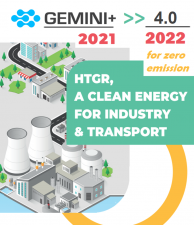GEMINI 4.0 – polygeneration for industry and heating
29-03-2022
The National Center for Nuclear Research takes part in the implementation of the international GEMINI 4.0 project carried out by over 20 institutions from Europe, Asia and the USA. The partners will develop a concept for the use of a high-temperature reactor for emission-free production of process and municipal heat, hydrogen, ammonia and other applications.
Decarbonisation of power systems is possible thanks to the well-known and proven technology of light-water reactors. However, electricity production is only responsible for around 1/4 of CO2 emissions in Europe. Industry, transport and district heating account for around 60% of emissions. The electrification of these applications is difficult or economically unjustified. Scientists and engineers propose the use of high-temperature HTGR reactors for the purposes of cogeneration* and polygeneration**. The implementation of high-temperature reactor technology in the industry will allow to quickly achieve the climate goals, which are the ambition of many European countries.
The design concept of the GEMINI+ reactor was developed with its implementation in the Polish industry in mind and taking into account its needs. Market research shows that a reactor with a net capacity of 165 MWth is a good option for Poland and other European countries. The original concept of GEMINI+ assumed primarily the production of the heat carrier – superheated steam. „In the GEMINI 4.0 project, we plan to develop this concept into a well-scalable and flexible energy facility operating in polygeneration” – says Janusz Malesa, MSc., head of the Reactor Analysis Laboratory at the Department of Nuclear Power and Environmental Analysis. – „This means that in various proportions we will be able to produce high-temperature heat carrier, synthetic fuels and hydrogen, electricity, district heating for municipal purposes and others”.
In the previous project (H2020 / Euratom GEMINI Plus), various obstacles to the rapid implementation of this technology were identified. GEMINI 4.0 is to help with the technical refinement of the reactor design, optimal configuration of polygeneration products, as well as licensing and construction of the European fuel chain. As part of the GEMINI 4.0 project, optimization of the project assumptions and license agreements with institutions that will assess the nuclear safety of the proposed structure are planned. The system design will include its application to work in complex energy and industrial systems – polygeneration. Additionally, NCBJ will investigate the possibilities of qualifying TRISO fuel with the use of the MARIA reactor.
Although the idea of building an HTR-type nuclear reactor in Poland is not new, the problem of social acceptance of this technology still remains to be overcome. Therefore, the project also foresees the initiation of intensive communication with political and industrial stakeholders as well as with the general public, in particular taking into account the inhabitants of the potential locations. This communication is aimed at providing reliable information and shaping public opinion in order to gain broad support in the use of nuclear reactors to decarbonise the industry.
The GEMINI 4.0 project was positively assessed and received funding under the Euratom Research and Training Program (HORIZON-EURATOM-2021).
The project proposal was prepared by the Nuclear Cogeneration Industrial Initiative (NC2I) association, which is one of the pillars of the European Sustainable Nuclear Energy Technology Platform (SNETP). 19 partners from Europe as well as Japanese JAEA and Korean KAERI will take part in the project. Oregon State University (USA) will also participate. The project is coordinated by the French Framatome SAS.
Entities from Poland participate in the GEMINI 4.0 project: the Institute of Nuclear Chemistry and Technology, the Synthos company and the National Center for Nuclear Research, which is the leader of the WP1 task package „Optimizing safety and competitiveness of the GEMINI+ design”.
More news coming soon on the NC2I and / or GEMINI Initiative websites:
https://snetp.eu/nc2i/ https://gemini-initiative.com/
*Cogeneration – this is a classic CHP system: e.g. coal combustion or nuclear reactions generate energy for the production of municipal electricity and heat or heat for technological processes.
**We talk about polygeneration when we get more than two products in the energy conversion process. This can be done in several ways, adapting to the existing needs. The third product may be hydrogen. For example, when petrochemicals, which are the primary recipient of industrial heat from a nuclear installation, have lower steam requirements, the excess steam may be directed to the hydrogen production facility. As a result, it is not necessary to reduce the reactor power.





